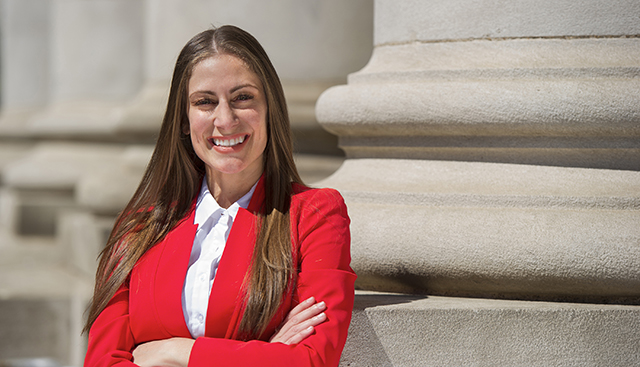Patient advocacy beyond the dental chair

This resident dove headfirst into the action with health care reform to determine how it serves a special population: pediatric dental patients.
By mid-April, more than 8 million Americans had signed up for health insurance under the Affordable Care Act. As part of the federal health care reform law, insurance plans must now provide dental coverage for children. Since consumers started enrolling in the insurance plans in October 2013, Dr. Ashley Orynich, a graduate student in pediatric dentistry at Texas A&M University Baylor College of Dentistry, has assessed the care provided to youngsters through the program.
“We wanted to see if the type of health insurance exchange selected by a state had an effect on the quality of the pediatric dental benefit mandate,” says Orynich, referring to a component of insurance reform through the Affordable Care Act. States can choose to partner with the federal government to operate their exchange, let the federal government run it entirely or run their own online insurance exchange where residents shop for health care plans.
Orynich’s research isn’t intended solely for her master’s thesis, which will be complete in the fall. As the 2014 American Academy of Pediatric Dentistry Samuel D. Harris Research and Policy Fellow, her work will also be published in peer-reviewed publications, and she’ll present her findings to date to the organization’s board of trustees during the AAPD Annual Session in May.
The work has not been simple.
“It has literally been a moving target,” says Orynich, who wrote her proposal for the fellowship in fall 2012. She recalls one meeting in late October of that year. As soon as she and her thesis research mentor, Regents Professor Dr. N. Sue Seale, started discussing the topic, they decided to postpone the project and regroup the following week — after the presidential election.
“At the time there was a lot of uncertainty,” Orynich says. “We knew that dentistry would be affected, but in what capacity would depend on who became president. Once President Obama was re-elected, health care system changes were more likely to reflect those posed in the Affordable Care Act. The project had to react and evolve accordingly.
“Policy research is fun in that way, and that’s what makes it challenging. You begin with a general idea for the direction you think the project is going to go, but you have to be flexible and adaptable.”
Since being awarded the yearlong fellowship in spring 2013, Orynich has been privy to some extra resources for her master’s thesis beyond what is available to most graduate students.
In addition to having access to nationally recognized health policy experts, Orynich has traveled the country to interview sources in person thanks to funds awarded as part of the fellowship. She’s talked with lawmakers, pediatric dentists and AAPD representatives to get a feel for how the varying health care exchanges work where it matters most: delivery of care to pediatric patients.
Scott Litch, chief operating officer and general counsel to the AAPD, is one of Orynich’s mentors and refers to her willingness to seek out state and federal level decision makers as “fearless.”
Litch directs the organization’s public policy efforts — including its political action committee — and analyzes legal and regulatory issues that impact pediatric dentists.
“While providing caring and excellent clinical care in the pediatric dental office is the goal of every pediatric dentist, there are so many public policy and social issues that also impact a child’s ability to establish a dental home and obtain excellent oral health,” Litch says.
“Therefore, a caring pediatric dentist is also engaged in such issues in their community as an advocate for children’s oral health.”
As part of the fellowship, Orynich also attended an Affordable Care Act conference in Chicago and the AAPD’s Public Policy Advocacy Conference in Washington, D.C., in March.
Amid concluding her research interviews, Orynich spent the week with a team of several Texas pediatric dentists and pediatric dental residents, jumping from meeting to meeting at House and Senate representatives’ offices, where she served as group spokesperson regarding the Affordable Care Act.
“I had completed this research in public policy, and there I was in real time experiencing what it meant to be a true advocate for my patients. It made me so proud to be a clinician,” says Orynich, whose interest in the field dates back to her first year at the Harvard School of Dental Medicine, where she received a dual degree in dentistry and her master’s in public administration from the Harvard Kennedy School of Government.
“It was inspiring to be around the pediatric dentists who have been fighting for the very advocacy issues I had been researching,” Orynich adds. “It was an obvious reminder of the need to be a clinician first and foremost while also understanding your patients’ needs and advocating for them. You don’t have to be a policy expert to do that.”
One of Orynich’s mentors, Dr. Paul Reggiardo, maintains a practice in Huntington Beach, Calif. An AAPD national spokesperson, he has worked with Orynich for the past year and in regulatory oral health activism for the last 20 years.
“We are not just the providers of pediatric dental care,” Reggiardo says. “Children and parents need to be able to depend upon us as knowledgeable experts and effective advocates whenever and wherever decision makers sit down to discuss or determine the nation’s oral health agenda.
“Dr. Orynich will make a difference in children’s lives, both at the dental chair and in the arena of public policy.”
—Jenny Fuentes